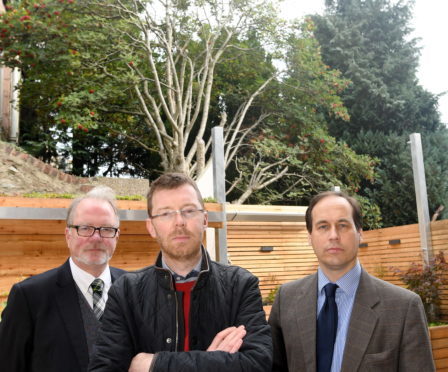A group of neighbours claim that overgrown shrubbery belonging to a theatre director is ruining their gardens and making their lives miserable.
Residents on Ashley Road in Aberdeen have attempted to secure a legal decree ordering Chris Begg, who runs the Quids In Theatre Company with his wife Annie, to chop down the growth which they say infringes on their properties and blocks out sunlight.
But Aberdeen City Council rejected the High Hedge Act appeal because the plant in question is actually a tree.
Last night, Mr Begg argued that he had been unable to maintain his garden after falling from a lighting rig and breaking his back in recent years, but vowed to do something about it in the near future.
Sam Andrew, a 45-year-old engineer, has led the crusade to have the shrubbery trimmed and refuses to give up the fight.
Mr Andrew, who lives with his wife and two children, said that problems with the “jungle-like” growth began years ago.
He said: “It has obviously only ever got worse and it blocks out a lot of light in the back.
“We have one neighbour in her 90s who is particularly upset about it.
“But the council has operated the High Hedge Act in a way which allows it to define what a hedge is, and they say this was not planted as a hedge and it therefore does not fit the criteria.”
The authority claims to use guidance from the Royal Horticultural Society (RHS) to define what a hedge is, but Mr Andrew argued that he contacted the RHS himself about his neighbour’s plant and the body agreed that it was indeed a hedge.
Mr Begg said: “I fully agree there is an issue with the garden, and I am happy to meet Mr Andrews to get this resolved as soon as possible.”
>> Keep up to date with the latest news with The P&J newsletter
Hazlehead and Queens Cross councillor Martin Greig believes the local case should spark a review of High Hedge Act legislation.
He said: “It is regrettable that the high hedges legislation is needed on some occasions.
“The act shows that owners do not always look after their gardens in a socially responsible way.
“I am keen to explore any opportunity to help in this case.
“City life has to live in harmony with nature and not in conflict.”
High Hedge Act
The High Hedge Act came into force in May 2014 as a means of settling disagreements between neighbours at odds over garden greenery.
Derek Mackay, who was minister for local government and planning at the time, compiled guidance for local authorities to follow when judging cases.
He said: “High hedge disputes are a fairly rare occurrence, but when they happen, they can spiral out of control and be a source of great concern for those involved.”
The matter first sprouted up in the north-east in Moray, in 2015, when a man was ordered to cut his 65ft hedge down to size after a bitter dispute with his neighbour.
Councillors ruled the height of John Albiston’s tree belt should be halved – with the work estimated to cost him £10,000.
The local authority was asked to intervene by Donald Brown after negotiations between the two men broke down.
Mr Albiston stayed at Little Buinach, outside Kellas, north-east of Dallas, and Mr Brown complained about that the shadow cast over his home, Buinach Lodge, left the spot “claustrophobic” and “depressing”.
The Scottish Parliament’s Local Government and Communities Committee set out recommendations for improvements last year, after examining the act.
During evidence sessions, the committee heard of some extreme cases where neighbours removed every alternate tree in order to avoid the row of trees or shrubs being classed as a “high hedge”.
